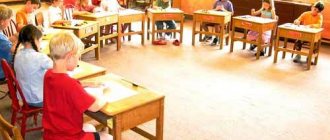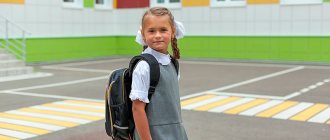What a first grader should know
Most school psychologists put forward four criteria for readiness to learn:
- Personal – developed if the educational institution attracts not only the opportunity to see friends every day, new beautiful notebooks and pens, but also the desire to learn something new and become smarter.
- Intellectual means competent, coherent speech, the ability to listen to the teacher, and the presence of certain knowledge and outlook.
- Social-psychological – includes the ability to communicate, the ability to concentrate on a lesson.
- Physiological – absence of developmental disabilities, physical health and psychological stability.
Children who attend kindergarten experience the first period of school easier than those at home. This is due to the fact that from the age of three and a half, teachers begin to teach them basic things, and by the first grade, kindergarteners have a certain amount of knowledge.
If parents work with their future student on their own, there is nothing to worry about. Gradual training of the skills necessary for learning at the initial stage will allow your son or daughter not only to feel confident among other children, but will also help develop an interest in learning.
Reminders on how to prepare your child for school yourself
The tasks that the school psychologist offers during consultation will help you understand what level of development the child is at. This is a mandatory stage, for the successful completion of which you need to work with the child for a long time.
Educational activities
Moms and dads should remember: your baby may not be able to do something. Don't put too much strain on your young head. The school is designed to tell the child about a huge number of things, broaden his horizons, and teach him how to live and work in a team.
However, there is a set of basic knowledge that a first-grader must possess:
- Full names, yours and your parents'.
- Address. Country, city, street and house in which he lives.
- Famous plants, animals and birds. The child must distinguish between popular plants and animals, distinguish a cactus from a chamomile, a fox from a tiger. A person who checks readiness for school may ask if there are any pets at home, ask to tell about a cat, a dog, a parrot. He can also find out which animal or plant the examinee likes most and ask why.
- Time. It is advisable that the first grader knows how to handle a watch. The main thing is that he distinguishes day from night, evening from morning. One of the options for the task: “Arrange the pictures in the correct order.” Most often they depict the daily routine.
- Geometric figures. Before entering school, most children know how to cut out a circle, triangle, or square. In addition, they are required to correlate objects by shape: the roof of the house looks like a triangle, and the house itself looks like a square.
- Colors. Boys and girls in preschool age learn not only the basic shades, but the number of colors in the rainbow and the order of their arrangement. Parents need to teach their child to draw basic pictures, choose the right colors for the image: the sun is yellow, the grass is green, and the bunny is white.
- Numbers. It is not necessary to teach the rules of subtraction and addition; the teacher will do this. Better teach how to count from 1 to 20 and back.
- Seasons, months, days of the week. During preparation, children should not only name them, but also know the number and place them in the correct order.
- Popular holidays. The psychologist may ask which one is your favorite. The kid must answer and tell why he chose this option.
- The structure of the human body. Drawing a person is a common task when entering school.
- Distinguish between living and nonliving.
- Basic traffic rules: “You can’t cross the road when it’s red,” “You can’t cross railroad tracks.” In a game form, a school worker can test this knowledge. For example, clarifying who is right, the green bunny who is waiting or the squirrel who is running in front of a moving car.
- Reading by syllables. If your child doesn’t know how to read, it’s not a big deal – they’ll teach you at school. However, this skill will greatly facilitate his learning in the future, and all other subjects will be easier.
- Retelling. Developing speech skills is one of the main tasks when entering first grade. At the beginning of the school year, the child must understand the meaning of short stories and arrange sentences in a logical chain.
- Memory. Several pictures are placed in front of the preschooler, he looks at them for a while, then they are turned over. The more details he remembers, the better. We need to reproduce the plot and tell what is depicted there.
Often school psychologists give tasks to identify unnecessary things. There are a large number of entertaining tutorials on which you can practice this skill, but classes can also be carried out using improvised means.
For example, ask your baby to choose what needs to be put away by offering him several fruits and one vegetable.
Behavior in society
Parents of a young schoolchild should think not only about academic performance, but also about how to help him join the class team. We offer recommendations that will help you understand how to quickly prepare your child for school over the summer.
Develop in it:
- Independence. Teach your child to dress and tie his own shoelaces, take care of his appearance and change into sportswear before physical education. You can show that he is an adult, an equal, but this status has not only privileges, but also responsibilities. There is no need to collect the briefcase for him; it is better to check when the job is already done. The same goes for homework: try to convey in a gentle manner that keeping a school diary is his business. But don't go too far on this issue. Remember that first of all, the baby should feel your love and support. Let him feel that he has a reliable rear where he can come with any problem, both life and academic.
- Perseverance. It’s difficult for little ones to readjust after the unemployed years of childhood, and the time of a standard lesson seems like an eternity to them. When exercising with your son or daughter, help them get used to doing an activity for a while, gradually increasing the load. We recommend starting with 15 minutes, and by the beginning of the school year increase the time to half an hour.
- Friendliness. Tell them why you shouldn’t fight with your classmates and call them names, but don’t forget to add that you need to be able to stand up for yourself. Explain that lying is bad. At the same time, try to convey that in some situations it is necessary to tell adults about what happened. For example, if someone tortures animals or offends the weak.
- Politeness. Teach your son or daughter the formulas of etiquette communication. Remind that when meeting any person you need to say “hello”, and when saying goodbye “goodbye”, explain about “thank you” and “please”.
A very important point that you should set your child up on is cultural behavior during recess. He must know that at school he cannot run through the corridors, shout, or climb on furniture with his feet.
Consultation for parents “Preparing your child for school”
Tatiana Streltsova
Consultation for parents “Preparing your child for school”
CONTENT
INTRODUCTION 3
1. Criteria for the readiness of a child of senior preschool age for school 4
2. Advice for parents on preparing their child for school 6
CONCLUSION 8
REFERENCES 9
INTRODUCTION
Starting school is a new stage in a child’s life, and it certainly requires a certain level of readiness for this qualitatively new stage in life and a completely new type of activity - educational, while the leading activity of a preschool child is play .
Readiness to learn is a very broad concept; it cannot be understood solely as the necessary level of knowledge, skills and abilities necessary for successful mastery of primary school subjects . Readiness for learning includes such psychological characteristics, physical development and spiritual and moral readiness of a preschooler for a new stage of his life.
The problem of a child's readiness for school is very important : most of the sources of possible school difficulties and troubles are often hidden precisely in preschool childhood .
Therefore, the purpose of the consultation will be to obtain knowledge on preparing children for school .
To achieve this goal, we will solve the following tasks:
1. consider the criteria for preparing a preschool child for school ;
2. We will develop tips for parents on preparing their child for school .
1. Criteria for the readiness of a child of senior preschool age for school
school readiness ? Readiness for school , or readiness to learn, is a certain set of parameters that can indicate a certain social and mental maturity of the child, as well as a certain amount of skills and abilities sufficient to start schooling [2 , 3].
From the definition we can conclude that there are various criteria (indicators, parameters)
child's readiness for
school : this is physical development, moral development, psychological development and mental development.
Let us characterize each of these criteria. school depends on how physically developed, healthy and seasoned the child is . We also note that organized physical education contributes to the mental development of children, since the necessary conditions are created for the normal functioning of the nervous system. [1]
Physical readiness includes general physical development: normal weight, height, chest volume, muscle tone, proportions, skin and other indicators that correspond to the norms of physical development of boys and girls of 6-7 years of age. This also includes the state of vision, hearing, motor skills (especially small movements of the hands and fingers), the state of the child’s nervous system: the degree of its excitability and balance, strength and mobility.
2. Moral development: how a preschooler morally and volitionally determines his successful education at school , as well as the formation of a life position. To successfully study at school, a child must be independent, organized, persistent, responsible, and disciplined. If these moral and volitional qualities are not formed in a child, then he may be lazy, not confident in his abilities, have low self-esteem, and be selfish, which, of course, cannot be a condition for successful learning. [5]
3. Psychological development: a child standing on the threshold of primary school must have an internal position, the necessary prerequisites for educational activities must be formed, and a special form of communication between the child and an adult must be developed. An adult should be an authority and a role model for a child. [4]
Psychological readiness also includes:
educational motivation (the child wants to go to school ; understands the importance and necessity of learning; shows a pronounced interest in acquiring new knowledge);
ability to communicate with peers and adults (the child easily makes contact, is not aggressive, knows how to find a way out of problematic communication situations, recognizes the authority of adults);
ability to accept a learning task (listen carefully, clarify the task if necessary)
.
4. Mental development, or mental development. Its importance and significance is due to the fact that primary school poses a very difficult task for the child - he must master written speech, which arises on the basis of oral speech and represents a higher stage of speech development. Successful mastery of reading and writing is impossible without a relatively high level of oral speech, development of auditory-verbal memory, mastery of sound analysis, development of visual-figurative thinking, the beginnings of logical thinking, as well as a certain level of general (activity, personal)
child development.
A preschooler must be ready for voluntary regulation of his cognitive activity, he must have developed cognitive interests; he must realize and desire to study at school .
[2, 3] Parents play a major role . Let's consider the basic recommendations for organizing this process in a family setting.
2. Advice for parents on preparing their child for school
Preparing a child for school is a very important process, so we offer recommendations to parents that will help a preschooler calmly move to the next stage of his life.
1. The family education program for a senior preschooler must include sports, outdoor games, body conditioning, and morning exercises. A large place is occupied by the issues of sanitary and hygienic training of children , the development of skills and habits of personal hygiene, and a culture of behavior.
2. It is also necessary to establish the right relationships between boys and girls - relationships of camaraderie, mutual attention and care. Thus, the best means of cultivating correct relationships is the personal example of father and mother, their mutual respect, help and care, manifestations of tenderness and affection. If a child sees good relationships in the family, then, as adults, they themselves will strive for the same beautiful relationships.
3. An older preschooler must be actively involved in work that is feasible for him. Fulfilling work assignments forms the child’s discipline. It is also necessary to accustom the child to the thoroughness of the tasks he carries out, to teach him to complete the task or game he has started, and to show persistence and perseverance.
4. It is necessary to constantly carry out the mental development of the child: to enrich his vocabulary, in conversation to give him an example of good pronunciation of sounds and words and sentences in general. In order to develop speech, children can be taught to observe natural phenomena, identify similar and different things in them, listen to fairy tales and stories and convey their content, answer questions and ask their own.
preschoolers using play situations will be useful and even necessary (since this is the leading activity at this age)
.At the same time, you need to feel a fine line: you cannot turn
the “last”
year of childhood into
a mini-school .
There is no need to force a child to do an exercise if he is tired, constantly fidgeting, or upset. Try to determine the limits of your child's endurance and increase the duration of classes by a very short period of time each time. However, do not forget that the best exercises are systematic ones. 6. It is necessary to pay great attention to the formation of psychological readiness:
one should not “scare”
the school , but, on the contrary, tell positive stories associated with it, form a positive attitude towards it: that he will have many friends there, it is very interesting there, the teachers are very good and kind;
there is no need to be too demanding of the child, the child has the right to make mistakes, because mistakes are common to all people, including adults;
It is necessary to develop communication and collaboration skills.
CONCLUSION
When a child first crosses the threshold of school , a new stage of his life will begin. for parents to try to ensure that this stage begins with joy, and that this continues throughout his entire education at school . A child should always feel the support of his parents , their strong shoulder to lean on in difficult situations. A parent should become a friend, adviser, and wise mentor to his child, and then the first-grader will turn into a successful person in the future.
Let us also conclude that preparation for school should be comprehensive. Classes to prepare for school should include tasks, exercises, games to develop physical and intellectual abilities, emotional and volitional qualities and social and psychological competence. Focusing on just one thing, for example, intellectual development, will not give the desired result.
BIBLIOGRAPHY
1. Avseenko, N.V. Model of formation of readiness of older preschoolers to study at school / N. V. Avseenko // Primary school plus : before and after. – 2011. – No. 8. – P. 91-95.
2. Gutkina, N.I. Psychological readiness for school : textbook / N.I. Gutkina. – St. Petersburg: Peter, 2004. – 207 p.
3. Krivykh, S. V. Readiness for school : theoretical analysis of the concept / S. V. Krivykh, M. V. Urbanskaya // Bulletin of the Tobolsk State Social-Pedagogical Academy named after. D. I. Mendeleev. – 2010. – No. 2. – P. 75-86.
4. Tikhomirova, O. B. The problem of preschool children’s readiness for school in psychological and pedagogical literature / O. B. Tikhomirova, T. V. Naumova // Science of the XXI century: questions, hypotheses, answers. – 2014. – T. 1 No. 1. – P. 80-83.
5. Shakhbazova, I. D. The role of the family in the development of a child’s readiness for / I. D. Shakhbazova //Training and education: methods and practice. – 2013. – No. 6. – P. 226-230.
How to better prepare your child for school at home: advice to parents from a psychologist
Practitioners working with preschoolers offer several recommendations for those who are growing a future first-grader:
- Don't compromise the teacher. Even if you disagree with him on some issues, express your dissatisfaction in a personal conversation, and not to your son or daughter. If you feel that due to youth, inexperience or other factors, the teacher cannot cope with the responsibilities assigned to him, try to help him. For example, invite the parent committee to remove some of the social burden from the teachers’ shoulders. Psychologists say that primary and secondary school age is a time of searching for new authority, in addition to parental authority. The middle level looks for it in their peers, and the junior level looks for it in the teacher. Therefore, it is very important for moms and dads not to undermine this authority, but to support it in every possible way. Disappointment with a primary school teacher can greatly shake the personality structure.
- Talk to your children. Be sure to ask how each school day was. Please note that the conversation should not be limited to listing the grades received and discussing the cafeteria menu. Ask what you liked in the lessons and what you didn’t, what you remembered and what interested you. If you don’t have time, it’s better to move the conversation to the evening or choose another free time, but don’t interrupt it mid-sentence. Children talk about what seems important to them, so the ability to listen and hear your baby is necessary for every adult. In adolescence, parents begin to repeat loudly: “He/she doesn’t tell us anything, brushes aside all questions.” Closedness and distrust of adults develop in schoolchildren in the first years of education if they feel that mom and dad do not have time for their problems and worries. To prevent this from happening in your family, remember that your child will trust you with secrets only if he sees an interest in them.
- Do not evaluate learning activities. Leave it to the teachers. You should help and support the young student, and not take on the role of a supervisor. If a child cannot cope with some subject, start studying with him, and do not scold him for bad grades.
- Let me rest. Even if academic performance leaves much to be desired, do not force the “failing student” to study all day long. Allocate time so that there is enough time to complete basic lessons, and for additional exercises, and for the boy to play football in the yard, and for the girl to jump in hopscotch or ride a bicycle. Focus on active, outdoor games that take place in the fresh air. They unload the consciousness, freeing it to accept new knowledge. But computer shooting games and watching cartoons can be reduced until the grades return to normal.
- Don't read textbooks in advance. There is no need to go over a year's worth of material over the summer with your future first-grader. He will become bored in class and lose interest in learning. If the material is very easy for your child, consult with the class teacher. Schools have several programs of varying complexity: if necessary, the level can be increased.
- Be mindful of temperament. When choosing a school, pay attention to the type of nervous system of the person who will study there. Choleric people are active and restless, they take criticism hard. For them and for sanguine people, programs of increased complexity are suitable. A wide variety of tasks will not only keep them focused on their studies, but will also help increase interest in school life. For phlegmatic and melancholic people, the fast pace of the lesson will be a difficult test. They get involved in their work gradually and think about one task for a long time. Choose a regular school for them, with standard requirements or a focus on one area.
- Teach by playing. Determine the subject that your little student likes most and expand his horizons in this area, use game techniques. If he shows interest in the world around him, go to parks, zoos, aquariums together, and read more books about animals. If he likes math, count steps, people on the street, steps to the store or to school. If he is interested in stories about the events of the past, put together a family tree, ask your grandparents to tell you something, and the Genealogy House will help you get unique information about your family.
When preparing your child for school, listen to psychologists and teachers, read methodological and popular scientific literature on this topic, ask for advice from friends who have already passed this stage, but do not try to blindly imitate all the recommendations.
You know your child like no one else, you understand his strengths and weaknesses. Only you can find the right approach to his home training and understand how best to prepare him. Listen to your heart, but do not forget about the advice of experts.
Difficulties and methods of preparation
Reading
Technically, children should not be able to read by first grade. However, this has become an unspoken norm, especially in large cities. If you look through modern textbooks for 1st grade, you can see that from the first days a child will need the ability to read and understand what he reads. It is important to take into account the average level of knowledge of future first-graders. For example, if a child goes to a top city gymnasium, then it is necessary to be able to read.
The main thing in learning is motivation. A child must have a need to read. Sometimes it is enough to read age-appropriate books together: poems, fairy tales, encyclopedias. Some children are fascinated by special manuals where they need to match letters to words, connect syllables, and solve puzzles. The environment plays an important role. Hang up a sound poster with the alphabet, play board games, for example, “Read-Grab”, write notes to your child with instructions on where to find a surprise.
It happens that a child avoids reading, although he has already learned to put letters into words. If you notice that your child is having difficulty reading, it is better to contact a speech therapist as soon as possible. It is necessary to help the child automate this process so that he learns search, semantic, and introductory reading in time.
Letter
The school curriculum is gradually changing and becoming more voluminous. Back in 1991, before the winter holidays, they learned to write according to the rules, and now from the first lessons they are asked to copy words and entire phrases from the textbook. Schools are unofficially placing ever higher demands on first-graders. This corresponds to the fashion for early development, but contradicts the laws of child development. For most children, sitting down to write penmanship at the age of 5-6 is boring and unnatural.
If a child has no desire to write, you should not force him with persuasion and threats. Instead of copywriting, do anything that prepares your hand and brain for writing. Draw, sculpt, strengthen your hands and posture, draw a room plan and mark the place where the “treasure” is hidden, work with wooden stencils, trace the contours of objects on paper. Give time for the need to write to mature. If a preschooler writes notes to you and enjoys doing copybooks, support him, but do not overload the child. Offer feasible tasks, praise for effort, but do not criticize.
Check
To succeed in school lessons in 1st grade, it is enough to confidently count to 20 and know the composition of numbers. Some preschoolers demonstrate clear aptitude for mathematics: they can easily add and subtract in their minds, see the logic of sequences, and remember visual images. Others count on their fingers, confuse the order of arithmetic operations and do not see the difference between increasing by two and doubling. Both will benefit from regular lessons so that mathematics does not seem too primitive or prohibitively difficult.
You can do mathematics in any circumstances: play “Pushkin Street, Kolotushkin House”, argue who is more in the world, dads or grandfathers, compare where there is more chocolate, ½ or 2/4 bars. Alexander Zvonkin’s book “Kids and Mathematics” will be an excellent help for mathematical conversations with a child. The tasks from the “Solve-Write” website and the notebooks of teacher Zhenya Katz will also help prepare your child for school.
Personal qualities
At school, the child will be required to have a large amount of independence: clean up after himself, get dressed, and come to class on time. To gradually prepare your child for school life, teach him self-care at home. By school age, a child can dress fully, help with cleaning and care for younger children.
Invite your preschooler to take on a couple of household chores and help him learn how to do them. At first you will have to do everything together, then just remind them. Make sure that the work does not take more than 5-10 minutes and always thank the child for his work. At 5-7 years old, a child can be entrusted with making the bed, sorting out shopping, washing the floor in his room, watering flowers, wiping and putting cutlery in place. His own area of responsibility and work habits will help the first-grader pack his backpack and do his homework.
Motivation
For a child to want to go to school, he must have a positive educational experience. For example, it was sometimes easy for him, sometimes difficult, but almost always interesting in his kindergarten classes. Or a preschooler studied English online: gradually learned new things and noticed his progress. You can build learning motivation at home. Communicate more with your child, ask questions together and find answers, carry out experiments and read Wikipedia.
To prepare a child for school, you need to teach him to talk to different people, read, draw, experiment with natural materials, play outdoor and board games. In preschool childhood there should be enough time for rest and play with children, regular sports and creativity, and family leisure.








